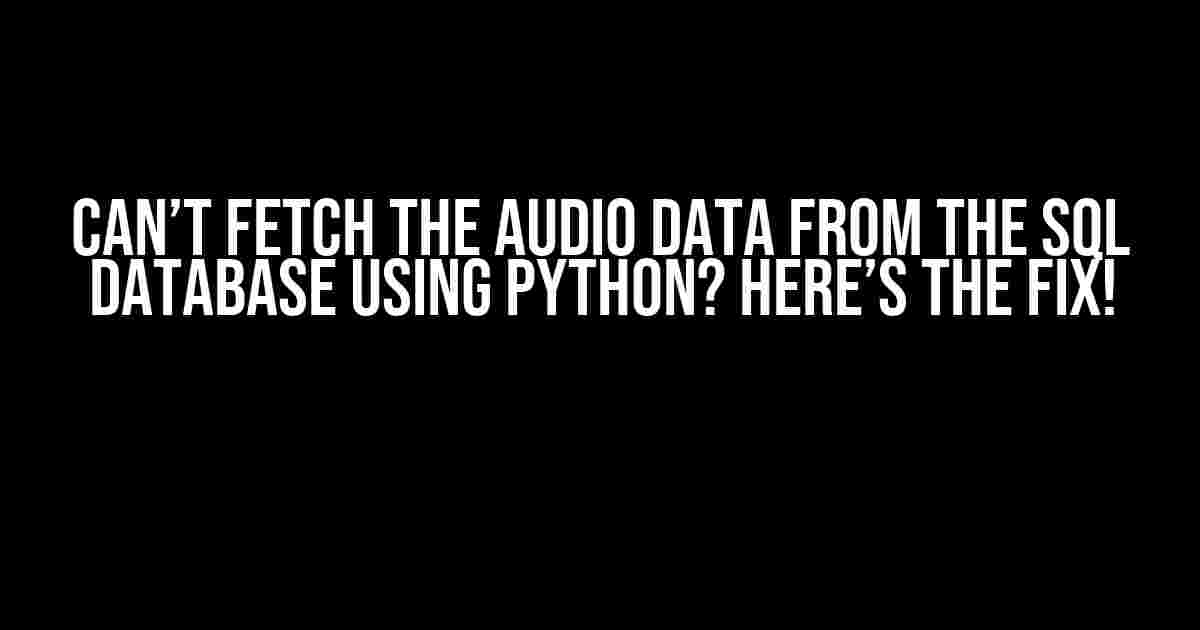Welcome to the most frustrating error you’ve ever encountered: “Can’t fetch the audio data from the SQL database using Python.” Don’t worry, you’re not alone, and we’ve got you covered. In this article, we’ll dive into the world of SQL, Python, and audio data to help you solve this pesky problem once and for all.
What’s the Problem?
Before we dive into the solution, let’s understand the problem. You’ve got an SQL database filled with audio data, and you’re trying to fetch it using Python. Sounds simple, right? But, for some reason, you’re stuck with an error that’s preventing you from accessing your precious audio files.
There are several reasons why this might be happening:
- Incorrect database connection settings
- Invalid SQL queries
- Audio data not stored correctly in the database
- Incompatible Python libraries or versions
The Solution: A Step-by-Step Guide
Don’t worry, we’ll tackle each of these issues one by one. Follow this step-by-step guide to fetch your audio data from the SQL database using Python.
Step 1: Check Your Database Connection Settings
First things first, make sure you’ve got the correct database connection settings. Here’s an example using the `sqlite3` library:
import sqlite3
# Create a connection to the database
conn = sqlite3.connect('database.db')
# Create a cursor object
cursor = conn.cursor()
Replace `’database.db’` with the path to your SQL database file. Make sure the file path is correct, and the database file is not corrupted.
Step 2: Validate Your SQL Queries
Now, let’s take a look at your SQL queries. Are you using the correct syntax? Are you selecting the right columns? Here’s an example of a simple SQL query to fetch audio data:
cursor.execute("SELECT audio_data FROM audio_table WHERE id = ?", (1,))
Replace `audio_table` with your actual table name, and `id = ?` with your actual condition. Make sure to parameterize your queries to avoid SQL injection vulnerabilities.
Step 3: Check Audio Data Storage in the Database
How is your audio data stored in the database? Are you using a blob field or a file path? Make sure the audio data is stored correctly and can be retrieved using your SQL query.
If you’re storing audio files as blobs, you’ll need to decode the blob data before playing it. Here’s an example:
import base64
# Fetch the blob data
cursor.execute("SELECT audio_data FROM audio_table WHERE id = ?", (1,))
blob_data = cursor.fetchone()[0]
# Decode the blob data
audio_data = base64.b64decode(blob_data)
# Save the audio data to a file
with open('audio_file.wav', 'wb') as f:
f.write(audio_data)
If you’re storing file paths, make sure the files exist in the specified location and can be accessed using Python.
Step 4: Choose the Right Python Libraries
Which Python libraries are you using to interact with your SQL database and play audio files? Make sure you’re using compatible libraries and versions.
For example, if you’re using SQLite, you can use the `sqlite3` library. For playing audio files, you can use the `pyaudio` or `simpleaudio` library.
import pyaudio
import wave
# Play the audio file
wf = wave.open('audio_file.wav', 'rb')
p = pyaudio.PyAudio()
stream = p.open(format=p.get_format_from_width(wf.getsampwidth()),
channels=wf.getnchannels(),
rate=wf.getframerate(),
output=True)
data = wf.readframes(1024)
while data != '':
stream.write(data)
data = wf.readframes(1024)
stream.stop_stream()
stream.close()
p.terminate()
Troubleshooting Common Issues
Still stuck? Let’s troubleshoot some common issues:
Issue 1:Incorrect Database Connection Settings
If you’re getting a `sqlite3.OperationalError`, check your database file path and ensure it’s correct. Also, make sure the database file is not corrupted or empty.
Issue 2:Invalid SQL Queries
If you’re getting a `sqlite3.Error`, check your SQL query syntax and parameterization. Make sure you’re selecting the correct columns and using the correct condition.
Issue 3:Audio Data Not Stored Correctly
If you’re getting a `TypeError` or `ValueError` when decoding the blob data, check how your audio data is stored in the database. Ensure it’s stored correctly and can be retrieved using your SQL query.
Issue 4:Incompatible Python Libraries or Versions
If you’re getting a `ModuleNotFoundError` or `ImportError`, check your Python library versions and compatibility. Ensure you’re using the correct versions and compatible libraries.
Conclusion
There you have it! With these steps and troubleshooting tips, you should be able to fetch your audio data from the SQL database using Python. Remember to double-check your database connection settings, SQL queries, audio data storage, and Python libraries.
If you’re still facing issues, feel free to ask in the comments below. Happy coding!
| Troubleshooting Checklist | |
|---|---|
| Database Connection Settings | Correct file path, not corrupted, and correct library version |
| SQL Queries | Correct syntax, parameterization, and column selection |
| Audio Data Storage | Correct storage format, blob decoding, and file path existence |
| Python Libraries | Compatible versions, correct imports, and correct usage |
Frequently Asked Questions
Stuck with fetching audio data from an SQL database using Python? Don’t worry, we’ve got you covered!
Q1: Why can’t I fetch audio data from my SQL database using Python?
This issue often arises due to incorrect database connections, invalid SQL queries, or incorrect column data types. Double-check your database credentials, SQL query syntax, and ensure that the audio data is stored in a blob or binary format.
Q2: How do I store audio data in an SQL database using Python?
To store audio data, use the BLOB (Binary Large OBject) data type in your SQL database. In Python, you can use libraries like `pyodbc` or `mysql-connector-python` to interact with your database. When inserting audio data, make sure to use the `binary` type in your SQL query.
Q3: What’s the best way to retrieve audio data from an SQL database using Python?
When retrieving audio data, use a Python library like `pydub` or `wave` to handle the binary data. You can also use PIL (Python Imaging Library) to convert the audio data to a playable format. Make sure to specify the correct column name and data type in your SQL query.
Q4: Can I use ORM (Object-Relational Mapping) libraries like SQLAlchemy or Django ORM to fetch audio data from an SQL database?
Yes, you can use ORM libraries to interact with your database. They provide a higher-level abstraction and can simplify your code. However, when dealing with binary data like audio, you might need to use custom types or converters to handle the data correctly.
Q5: How do I troubleshoot issues with fetching audio data from an SQL database using Python?
To troubleshoot, enable logging in your Python script and database to inspect the queries and error messages. Check your database connection, SQL query syntax, and data types. You can also use tools like `pdb` or a debugger to step through your code and identify the issue.


